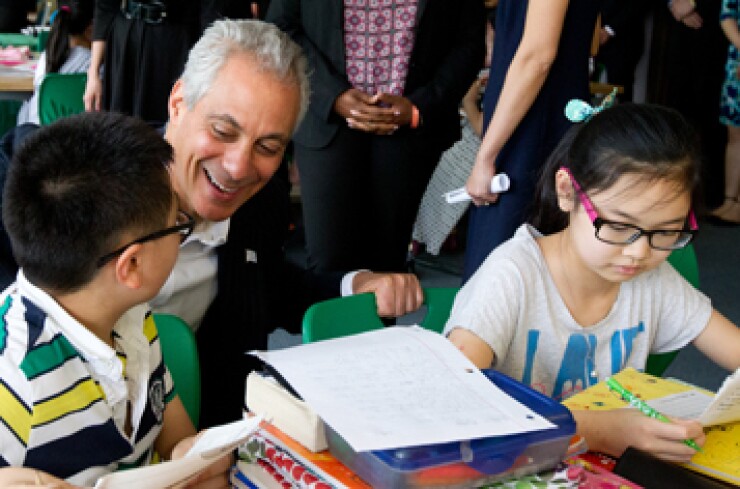
CHICAGO - Standard & Poor's stripped the Chicago Public Schools of its investment grade rating with a three notch downgrade saying a proposed budget does little to solve its structural or liquidity woes.
The rating agency took the action late Friday. In addition to dropping the rating assigned to the Chicago Board of Education's $6.1 billion of general obligation debt to BB from BBB, the rating agency removed the credit from CreditWatch with negative implications and assigned a negative outlook.
Fitch Ratings late last month dropped the district to BB-plus, one notch below investment grade, and has it on negative watch. That followed Moody's move in May dropping it to Ba3, three levels below investment grade, with a negative outlook. Kroll Bond Rating Agency rates the district BBB-plus on negative watch.
"The rating action reflects our view of the proposed fiscal 2016 budget, which includes what we view as the board's continued structural imbalance and low liquidity with a reliance on external borrowing for cash flow needs," said Standard & Poor's analyst Jennifer Boyd.
The rating agency attributes its dim view of the credit to concerns over the district's ability to ease its fiscal pressures.
CPS released a proposed $6.4 billion fiscal 2016 budget last week that includes more than $300 million from one-time revenues and gambles heavily on the state coming through with $480 million in pension help this year to close a $1.1 billion deficit.
"This budget reflects the reality of where we are today — facing a squeeze from both ends — in which CPS is receiving less state funding to pay our bills even as our pension obligations swell to nearly $700 million this year," newly appointed chief executive officer Forrest Claypool said. The board will vote on the budget Aug. 26.
While Gov. Bruce Rauner and lawmakers have offered up various proposals that would provide the aid being sought, they've yet to bridge a political divide that has stalled passage of a state budget or finalized any pension help for CPS or Chicago.
The proposed budget relies on $480 million in state help through some combination of measures that include the state picking up about $200 million in CPS pension contributions that would bring it in line with what the state contributes on behalf of other districts. The district's payment to its teachers' pension fund, which is saddled with $10 billion of unfunded liabilities, totals $688 million in fiscal 2016.
The package could also be made up by shifting $170 million of the teachers' contribution now paid by the district over to teachers, extending a payment amortization period, and possibly higher property taxes.
The gap is further closed with $200 million of cuts announced last month after the district failed in its efforts to delay its fiscal 2015 pension payment. The budget also relies on $250 million of debt relief primarily from $200 million in so-called scoop and toss refunding in which principal payments coming due are pushed off.
The district will draw $75 million from reserves. General fund reserves have dropped to about $159 million. The district will draw down its special debt service fund to $9.5 million from $57.1 million in fiscal 2016.
Another $62 million would come from tax-increment financing surplus revenues. Another $80 million would come from additional property tax revenue. The district is limited in its property tax levy due to state tax caps.
Standard & Poor's takes the district to task for relying on $480 million in state help that it hasn't yet secured and for the use of debt restructuring and reserves, both non-recurring revenue sources.
"The rating is also based on our view of the challenges the board faces in attempting to secure a sustainable long-term solution to its financial pressures, given the state's own financial problems reflected in the current budget stalemate, and the board's fiscal 2016 budget proposal that shows the continuation of a structural imbalance even if the board gets the assistance from the state," Standard & Poor's added.
Analysts said they are concerned about the district's cash flow projections, which are in the red for much of the year and will require the use of credit lines.
The district said last week it would manage cash flow by tapping a $935 million board-authorized credit line. The district does not yet have all the bank support needed for the full amount.
The district tapped its existing $500 million line and a new $200 million line at the end of June to cover more than $600 million owed to its teacher's pension fund. It must repay that borrowing in October.
The board has given initial approval to new borrowing of $1 billion in the coming months, with between $600 million and $650 million going for capital projects already underway. The remainder would cover interest rate swap cancellations of more than $200 million due to terminations triggered by previous rating downgrades and the scoop and toss refunding.
Chicago schools in recent market appearances paid steep interest rate penalties. The top yield of 5.63% on the board's 25-year maturity in an April sale landed 285 basis points over the Municipal Market Data's triple-A benchmark. Market participants said spreads in recent trades have ranged from 290 to 320 basis points. Rating agencies have raised concerns over the district's market access.
The board's bonds carry a GO pledge but most are further secured by an alternate revenue pledge of state aid. Much of the board's debt is also insured.
Standard & Poor's said the expiration of the district's teachers' contract in June poses additional challenges because the district faces contentious negotiations as it attempts to press teachers to accept a phasing out of its coverage of 7% of the teachers' 9% contribution to the pension fund.





